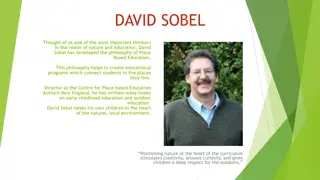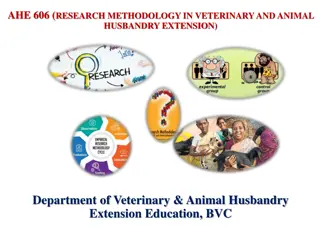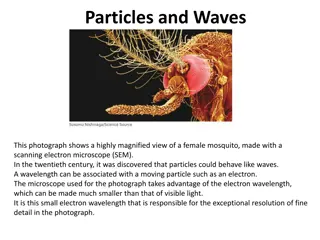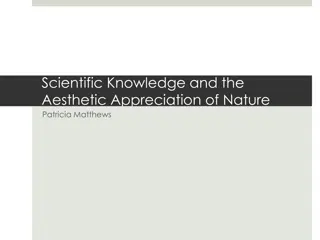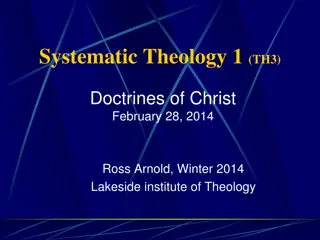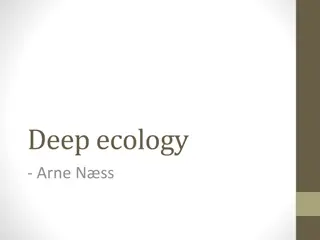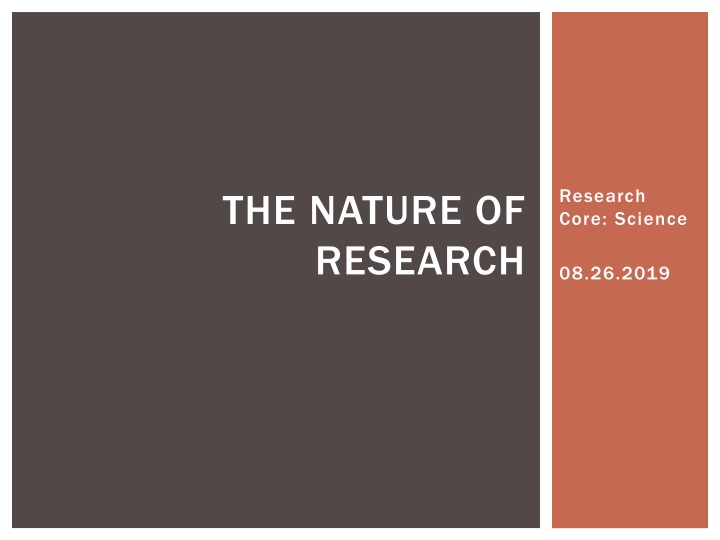
Process of Research in Science
Explore the principles and key components of research in the scientific realm, including problem identification, hypothesis development, data collection, and drawing conclusions. Gain insights into variables, theories, hypotheses, and the distinction between quantitative and qualitative research methods.
Download Presentation

Please find below an Image/Link to download the presentation.
The content on the website is provided AS IS for your information and personal use only. It may not be sold, licensed, or shared on other websites without obtaining consent from the author. If you encounter any issues during the download, it is possible that the publisher has removed the file from their server.
You are allowed to download the files provided on this website for personal or commercial use, subject to the condition that they are used lawfully. All files are the property of their respective owners.
The content on the website is provided AS IS for your information and personal use only. It may not be sold, licensed, or shared on other websites without obtaining consent from the author.
E N D
Presentation Transcript
Research Core: Science THE NATURE OF RESEARCH 08.26.2019
PRINCIPLES OF RESEARCH A working definition of research is the systemic process of attempting to find a solution to a problem (when the solution is not known)using an acceptable methodology. Many people use the term research loosely, when, in fact, the process of research is much more investigative and scientific. John Dewey (1933) outlined the scientific process of research consisting of: Problem identification, developing a hypothesis, collecting and analyzing data, and drawing conclusions concerning the data and hypothesis.
SO. The basis of Dewey s description of scientific research is somewhat similar to the process used today. Although variations in the process exist, depending upon the research methodology, the process is generally accepted as a general framework for scientific inquiry. Problem Identification Clarification of the main question Description of hypothesis Collection and Analysis of Data Drawing Conclusions Rejecting and Accepting Hypothesis
THEREFORE The term Theory can be described as an explanation of observed phenomena. Abraham Maslow s Sociological Human Need Theory Piaget s Theory of Human Development A variables a quantitative way to describe a concept. Typically, the two kinds of variables are independent variables and dependent variables. Independent variables are defined as the cause of some action and dependent variables refer to the effect of some action. Therefore, variables are often used in research to help describe a cause and effect relationship.
HYPOTHESIS One of the more popular terms used in research is the hypothesis. A hypothesis can be described as simply an Educated Guess . A more scientific definition might be the description between two variables . Researchers often use two types of hypothesis: the Null Hypothesis and the Directional Hypothesis. The Null Hypothesis states that there is no difference or relationship between two variables. A directional hypothesis is when the researcher makes a guess that there will be a difference in two variables.
QUANTITATIVE VERSES QUALITATIVE RESEARCH The process of seeking the truth is defined as epistemology. The philosophy of science describes how researchers acquire knowledge. Basically, the two methods of epistemology is called qualitative and quantitative. Quantitative research is the type of scientific inquiry that is very objective in which the researcher attempts to be detached from from the actual subject of the study. Qualitative researchers, on the other hand, are much more personally involved in their study. Qualitative research is more naturalistic, emergent, and case orientated.
AND A typical qualitative researcher might be a person who actually goes into a natural setting and makes observations. Different methods of research can be categorized as being more quantitative research are: experimental, casual comparative, correlational, and descriptive.
DIFFERENT METHODS Experimental research is concerned with the cause and effect of variables. Correlational research is to determine the relationship of variables, which can also be used for prediction. Casual comparative research is very similar to experimental research, but it is research that is conducted after the data has been collected (expost facto). Descriptive (survey) research is research that attempts to describe the present status of phenomena, such as administering a survey to acquire peoples feelings about (for example) schools.
SO Four types of qualitative research include: historical, ethnography, Phenomelogical and culture , and the case study. Historical Research is concerned with answering questions regarding the past. Such as conducting an autobiography. Ethnography generally describes people within social environments. Phenomelogical and cultural research tend to study varies phenomena and culture of people with in an enviorment. Case studies generally are used to study deviant groups or information rich subjects, such as gifted students , in their natural settings.
LETS WRAP IT UP! Quantitative Quantitative Experimental Casual Comparative Correlational Descriptive or Survey Qualitative Qualitative Historical Ethnography Phenomenology and Culture Case Study


